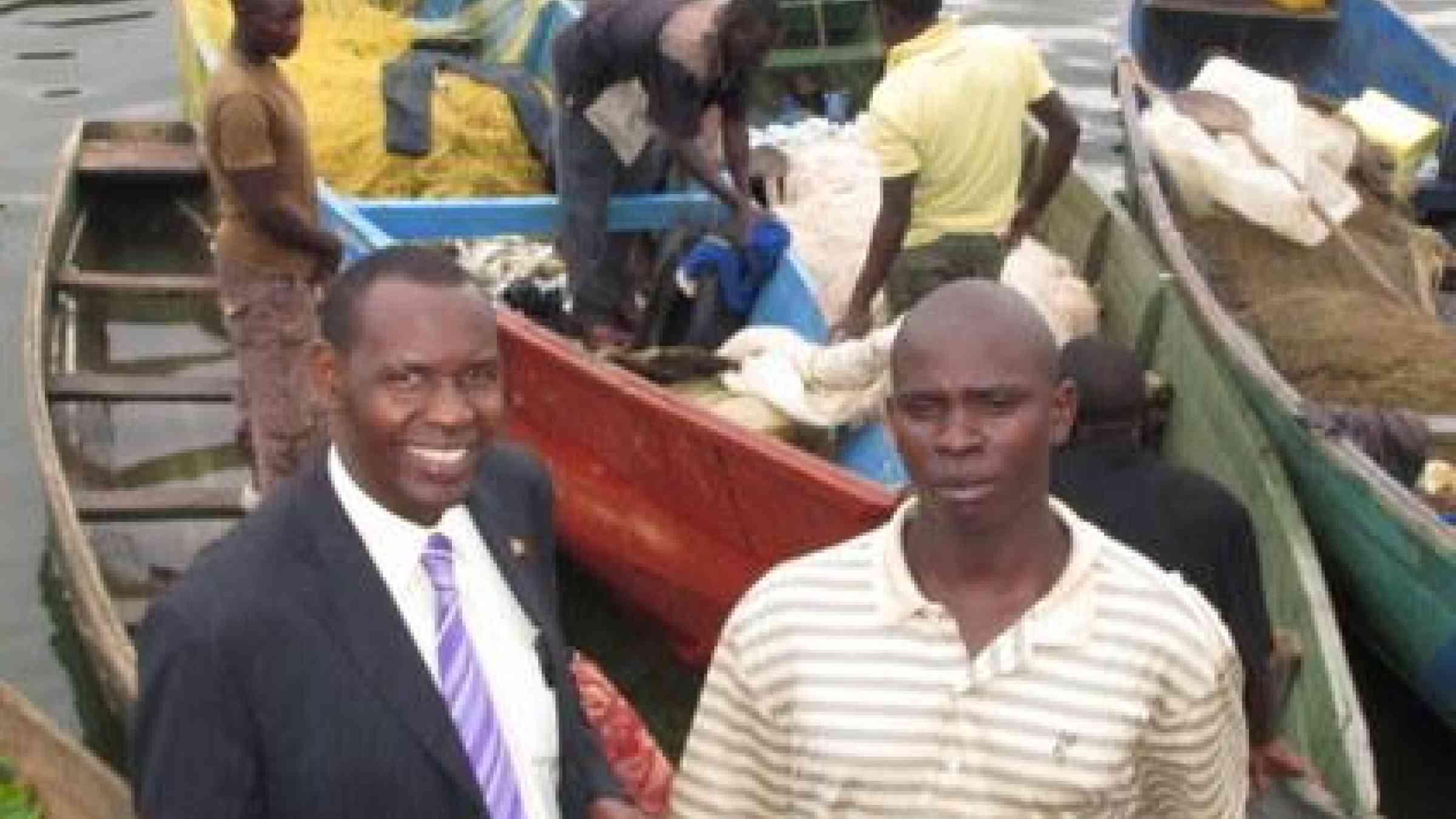IPCC negotiates in climate challenged Uganda

Alex Bakunda, MP and disaster risk reduction champion (left), with fisherman Babalanda Yusuf on the banks of Lake Victoria
By Denis McClean
KAMPALA, 17 November 2011 - Sporadic light rain fell this morning on the vastness of Uganda’s Lake Victoria as Alex Bakunda MP, chairman of the Ugandan Parliament’s Foreign Affairs Committee, chatted with local fisherman, Babalanda Yusuf, about the difficulty of making a living from fishing in Africa’s largest body of fresh water.
Originally from Ginja, 31-year-old Babalunda has been fishing out of Ggaba fishing port for the last eight years and during that time he has seen dramatic changes. He points to the meager collection of dying catfish on a wooden table nearby and says it’s possible to spend the whole night on the lake now and not catch anything.
The first change he remarks on though is the almost eerie absence of wind and waves on the lake in recent years. The lake has become stagnant in many places and polluted. Papyrus has been cut down as rich people create beaches and build villas on the lake shore.
Babalunda points about 100 metres back from the shoreline where we stand to indicate a line of trees and houses which once marked the boundary of the lake where levels have dropped in recent years as rains have diminished.
Unknown to Babalunda and his underemployed colleagues in the shoreline shanties of Ggaba, just ten minutes drive away, a large gathering is taking place of climate scientists, disaster risk experts and meteorologists who are poring over some 800 pages of the Inter-Governmental Panel on Climate Change’s (IPCC) Special Report on Managing the Risks of Extreme Events and Disasters to Advance Climate Change Adaptation (SREX) whose conclusions they hope to agree on this week.
What interests Alex Bakunda about these discussions is whether or not the outcome will motivate those who have contributed most to climate change, to provide adequate support to countries like Uganda to adapt to the disproportionate impact changes in weather patterns are having on all aspects of life in the country. These vary from fishing to coffee growing, from the availability of electricity to industrial output, and from the price of bananas to the rising costs of disaster response.
“Karamoja has been worst hit by drought but generally most parts of the country have been affected. Weather patterns have changed. We now get two months rains instead of four months. And then it doesn’t just rain but it pours with an intensity that destroys the little crops available. Floods are more common and so are landslides. Many people died in a landslide in Budanda two years ago. The intensity is too much especially in hilly areas,” he says.
He adds that the impact of drought can be seen in the decline of some 25% in the production of hydro-electric power from the waters o f the Nile “plunging most of the country into darkness and reducing our industrial output.” He expresses fears for the future of coffee-growing unless more research is done on developing drought-resistant coffee beans.
“South-western Uganda used to be the country’s bread-basket producing lots of bananas but recently we have seen a large decline. A bunch of bananas which used to cost 5,000 Ugandan shillings now costs 25,000.
“It is difficult to see how the Millennium Development Goal of reducing poverty will be achieved in these circumstances. Natural hazards, drought, floods and hailstones are affecting everything. It is all due to human-induced factors. We are getting more and more bitter as more and more information emerges on the causes of these changes.”
However, Alex Bakunda who has just started a second five-year term as MP for Isingiro-South, is not a man to stand idly by in this struggle. He has become a champion for disaster risk reduction in the 375-member Ugandan Parliament and recently created a Disaster Risk Reduction Forum of 65 MPs which is active on lobbying for implementation of the National Policy for Disaster Preparedness and Management and the development of a legal framework for disaster risk reduction.
The Forum was launched with the support of UNISDR’s head of advocacy, Feng Min Kan, in August. In addition to forging closer ties with the National Platform for Disaster Risk Reduction, he wants the Forum to reach out to other MPs and local government officials to raise awareness of disaster risk and to ensure it is factored into land use and urban planning.
“We have been concentrating too much on relief but we want to go beyond that and start investing in disaster risk reduction. Why should we build roads with small culverts when we know that floods will come? Why don’t we use some of our investment in agriculture to develop crops more resistant to drought? Why invest in 20 poorly built schools when the same money could provide 12 high-quality, long-lasting structures? Those are now some of the issues we are starting to talk about.”
Hopefully, they will also be among the issues referenced in the IPCC Special Report when the text is finally agreed on.